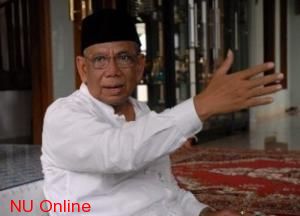Jakarta, NU Online
Member of the Lawmaking Body of the largest Muslim organisation, Nahdlatul Ulama (NU), KH Hasyim Muzadi has urged his fellow citizens to reject the false doctrine espoused by the Islamic State of Iraq and Syria (ISIS). <>
"We have no doubt that the teachings and the calls promoted by the terrorist group ISIS are wrong," he told a forum held last month at Maulana Malik Ibrahim Islamic State University in Malang, East Java.
"We need stronger actions, not just avoiding ISIS but resisting their ideology. ISIS has adopted a wrong ideology and is spreading wrong teachings of Islam," he said.
Hasyim was taking part in a November 19th forum on how to prevent radicals from infiltrating universities and recruiting young people for the militant jihadist cause.
As he put it, faculty at universities – especially Islamic state universities – had an important role to play in persuading students to resist the lure of extremist ideology.
"To fight mainstream intolerance, we need to extend the understanding of Ash'ariyah , which emphasises a moderate Islam," Hasyim stated.
Ash'ariyah embraces four different Mazhab (Islamic schools of thought) – Maliki, Hanafi, Syafi'land Hambali – which do not contradict local values, the former NU chief elaborated.
Among others who spoke at the Malang forum was Wawan Purwanto, an intelligence and security analyst who works for National Counterterrorism Agency (BNPT).
He told the forum some 300 Indonesians had joined ISIS in the Middle Eastern war zone, and the number of Indonesian recruits aged 17 to 25 was going up .
The number has since swelled to 514 Indonesian jihadists fighting in Iraq and Syria, BNPT chief Saud Usman Nasution told reporters December 1st.
At the seminar in Malang, Wawan noted that one of those who died for jihad in the Middle East was from the surrounding province. Wildan Mukhollad bin Lasmin , a native of Lamongan, was only 19 when he was killed in Iraq, Wawan said.
"We should not see more young people wasting their lives for a wrong goal. ISIS has recruited our youth and brainwashed them. ISIS supporters have gathered some funds to send these innocent youths to Syria," he added. "This cannot be tolerated, and therefore we need to educate our students. Everyone must be part of this effort, including family, the community, teachers, and the students themselves ."
The importance of teaching tolerance
Unfortunately, many Indonesians who have joined ISIS are educated youths and university graduates, according to Muhammad Sayed, a cleric in Malang.
"It has nothing to do with your intelligence; it is a matter of the growing intolerance and radicalism in our country, and ISIS has used this opportunity to get them," he told Khabar Southeast Asia.
In his view, reducing intolerance is one way to contain radicalism.
"When people have tolerance, they will be more appreciative toward others who do not belong to their group. I am sure this is only one approach. There are many more ways that we can pursue, but I think this is a basic one," he told Khabar.
"We need to ensure that those in charge of teaching our children are not part of ISIS's supporters," Sayed added.
East Java: Phenomenon of local radicalism
Joko Prasetyo Purnomo, a political and social science student at another campus in Malang, the University of Brawijaya, said he wondered why East Java had become prone to jihadist recruitment activities.
"Maybe a historian can explain this dynamic, but East Java has contributed to the large number of individuals who are joining militants, including in the Bali bombing incidents and many others incidents," he said.
To counter the influence of radicals in schools, Joko suggested that pesantrens broaden curricula and teach non-religious subjects, such as math, science, art and languages.
"It is important to open their [students'] horizons, to enlarge their knowledge about some other things and allow them to appreciate all of this knowledge. To show that they have an opportunity to be part of it by studying hard, and this is a true jihad in their capacity as students," Joko told Khabar.
Editing by Sudarto Murtaufiq
Terkait
Terpopuler
1
Khutbah Jumat: Ramadhan dan Kesempatan yang Tidak Selalu Terulang
2
Innalillah, Ulama Mazhab Syafii asal Suriah Syekh Hasan Hitou Wafat dalam Usia 83 Tahun
3
Kultum Ramadhan: Lebih Baik Sedikit tapi Istiqamah
4
Keluar Mani yang Tidak dan Membatalkan Puasa
5
Khutbah Jumat: Ramadhan, Melatih Sabar, Memperkuat Syukur
6
Khutbah Jumat: Tiga Kebahagiaan Orang Puasa
Terkini
Lihat Semua



